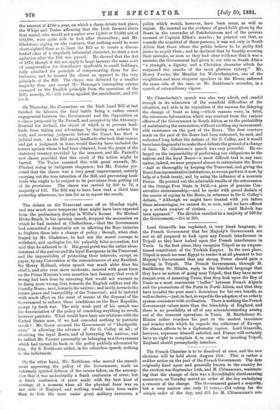The debate on the Transvaal came off on Monday night,
and was much more temperate than might have been expected from the preliminary display in Willis's Rooms. Sir Michael Hicks-Beach, in his opening speech, dropped the accusation on which he had insisted at Cheltenham,—that the Government had committed a despicable act in allowing the Boer victories to frighten them into a change of policy ; though, when chal- lenged by Mr. Gladstone, he had not the moral courage to withdraw, and apologise for, his palpably false accusation, but said that he adhered to it. His great point was the unfair aban- donment of the natives and the loyal Europeans in the Transvaal, and the impossibility of protecting their interests, except on paper, by any Convention or the remonstrances of any Resident. Sir Henry Holland, whose speech was much abler than his chief's, and also even more moderate, insisted with great force on the Prime Minister's own assertion last January, that even if wrong had been done by annexing, that would not warrant us in doing more wrong, first, towards the English settlers and the friendly Boers; next, towards the natives ; and lastly, towards the future peace and tranquillity of the Transvaal ; and he insisted with much effect on the want of means at the disposal of the Government to enforce these conditions on the Boer Republic, except by fresh war. The only weak part of his speech was his denunciation of the policy of conceding anything to revolt, however patriotic. What would have been our relations with the United States now, if we had conceded nothing to patriotic revolt ? Mr. Gorst accused the Government of " bloodguilti- ness," in allowing the advance of Sir G. Colley at all ; of deceiving the loyal Boers, and of betraying the natives ; and he rallied Mr. Forster personally on belonging to a Government which had turned its back on the policy publicly advocated by him. Sir S. Northcote added, in his colourless speech, nothing to the indictment.


































 Previous page
Previous page